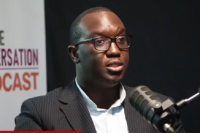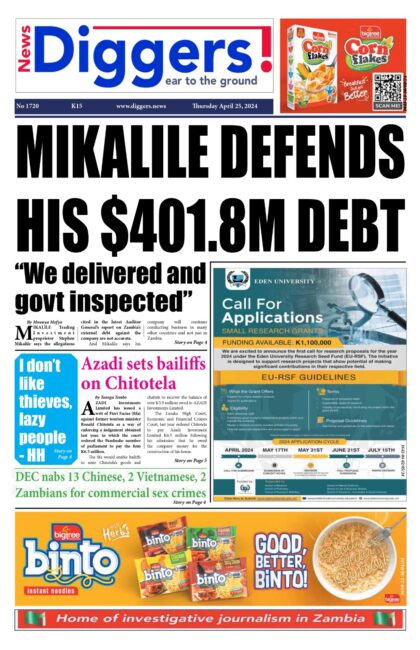Lusaka farmer Jonathan Van Blerk and Denny Nyoni, an administrator of the estate of Violet Nyoni, have lost their appeal over the Baobab land in the Court of Appeal.
This was after the Court of Appeal threw out the matter in which the two had appealed against Lusaka High Court’s decision to dismiss the case where they sued the Attorney General, Lusaka City Council, Legacy Holding Limited, Kwikbuild Construction Limited and Bantu Capital Corporation Limited for acquiring a portion of farm No. 4300.
Van Blerk had appealed against the ruling of Justice Matthew Zulu that dismissed the matter where he sought a declaration that he was the rightful owner of farm number 4300, for being res judicata and an abuse of court process.
The background to the appeal was that Van Blerk was the registered owner of Farm No. 4300 Lusaka, prior to 1987.
On April 22, 1987, a notice of intention to acquire property and notice to yield possession was issued by the Ministry of Lands and Natural Resources, pursuant to section 5 and 6 of the Lands Acquisition Act 1970.
Under this notice, the President of Zambia acquired 3512.42 hectares of the said farm.
Van Blerk was not too pleased with this move and challenged it in court by commencing the action by originating summons, but it was dismissed for incompetence.
The appellant recommenced the action by Writ of Summons, to which the matter was tried and judgment rendered in favour of the Attorney General.
This favourable determination was impelled by the evidence that the property was acquired for public use as the Lusaka City Council was to build a Housing Estate Complex on part of the land and it was also to be demarcated into residential stands to be allocated to civil servants and other workers in need of residential stands.
Not to be dissuaded by this judgment, Van Blerk appealed against it but the Supreme Court upheld the judgment, agreeing with the reasoning of the High Court judge.
But contrary to the reasons given for the acquisition of the land, the President, through the Attorney General and the Lusaka City Council, leased a portion of the acquired land to Legacy Holdings Limited, a private entity, to build a hotel and a luxurious golf course.
After Legacy Holdings Limited abandoned the portion which was leased to it, the same was repossessed and leased to Kwikbuild Construction Limited for agricultural purposes.
However, the said lease has breached the agreement through subdivision of the land for purposes of sale and construction.
In addition to this, the Attorney General and LCC leased a portion to Bantu Corporation Limited.
These discoveries led Van Blerk to conclude that the judgment of the High Court, confirmed by the Supreme Court, was procured by false or fraudulent misrepresentation.
He recommenced the matter, challenging the acquisition of part of Farm No 4300 for fraudulent misrepresentation in the courts but LCC, Kwikbuild Construction and Bantu Capital Corporation asked the court to dismiss the matter for being res judicata and an abuse of court process.
Judge Zulu then dismissed the matter for the advanced reasons.
The turn of events prompted the appellants to appeal to the Court of Appeal.
However, Court of Appeal president Fulgency Chisanga and judges Mubanga Kondolo and Catherine Makungu dismissed the appeal saying it was not competent to re-open the matter on any ground whatsoever since the legislature had stipulated that a matter heard and determined by the Supreme Court would have been conclusively dealt with.
They further stated that although the reasons preferred by the trial judge were erroneous, the matter cannot be re-litigated by virtue of Section 14[1] of the Compulsory Acquisition Act.
“Section 14(1) of the Act underscores the necessity of putting such matters to rest in public interest, once a matter has been in the High Court, and an appellate court. Although the reasons preferred by the trial judge were erroneous, it turns out that the matter cannot be re-litigated by virtue of section 14(1) of the Compulsory Acquisition Act. Having expressed our opinion, we conceive no necessity to address other issues. We dismiss this appeal for reasons articulated above. The costs are for the respondents to be agreed and in default taxed,” the court ruled.












